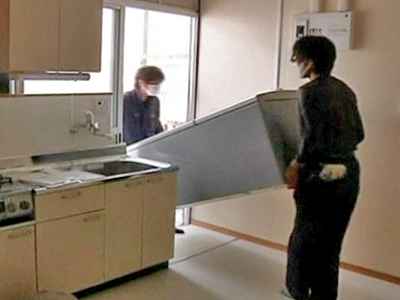
Small Signs of Hope for Japanese Evacuees, But Aid Still Slow

Many tsunami victims are still struggling here in cramped evacuation centers and on soup kitchens. It’s been nearly four weeks since Japan’s earthquake and tsunami killed nearly 28-thousand people and rendered more than 160-thousand homeless.
But small signs of hope and progress come in the form of temporary houses—in this fishing town of Rikuzentakata, 36 temporary houses are being readied for people to move in on Sunday.
Workers are busy installing refrigerators and washing machines donated to the temporary houses by the Red Cross. The two-bedroom container houses are also equipped with televisions and air conditioners.
A total of 200 temporary homes will fill the playground of Rikuzentakata No.1 public high school in months, and up to 2,000 will be built citywide.
However, there has been criticism domestically and overseas that aid hasn’t been reaching those most in need.
The Japanese Red Cross has borne the brunt of this criticism having collected an unprecedented $1.3 billion in donations from the public.
[Tadateru Konoe, President, Japanese Red Cross]:
“Right now some have nothing, nothing to eat, having run out of their homes without even their wallets. So people are asking us to hurry up and distribute the money and that is natural. But there are still so many people missing, the local authorities are in chaos, and everyone is dispersed across many evacuation centers. So it’s technically very difficult to distribute all this aid equitably.”
The organization will also receive relief money from Red Cross groups around the world.
One such plan is to use this money to offer the same amenities in all the planned 70-thousand temporary shelters across three prefectures, similar to those put into the temporary houses in Rikuzentakata.
 Foto: NTD
Foto: NTD



























vielen Dank, dass Sie unseren Kommentar-Bereich nutzen.
Bitte verzichten Sie auf Unterstellungen, Schimpfworte, aggressive Formulierungen und Werbe-Links. Solche Kommentare werden wir nicht veröffentlichen. Dies umfasst ebenso abschweifende Kommentare, die keinen konkreten Bezug zum jeweiligen Artikel haben. Viele Kommentare waren bisher schon anregend und auf die Themen bezogen. Wir bitten Sie um eine Qualität, die den Artikeln entspricht, so haben wir alle etwas davon.
Da wir die Verantwortung für jeden veröffentlichten Kommentar tragen, geben wir Kommentare erst nach einer Prüfung frei. Je nach Aufkommen kann es deswegen zu zeitlichen Verzögerungen kommen.
Ihre Epoch Times - Redaktion